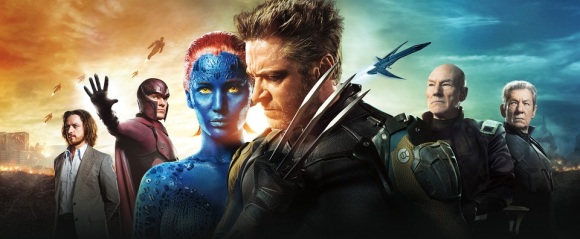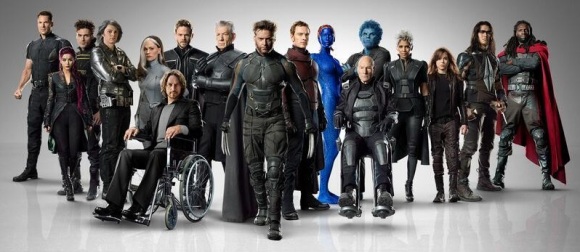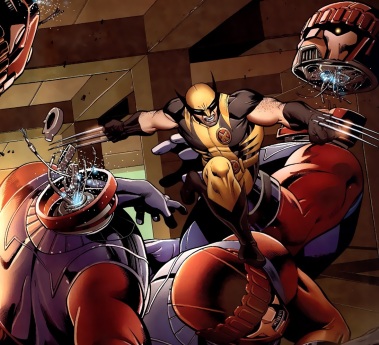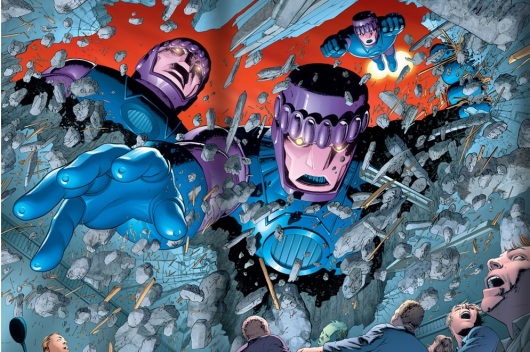
Before we begin, a disclaimer: I can’t even feign objectivity when it comes to the X-Men. I was an avid viewer of FOX’s Saturday morning cartoon at an impressionable age, and I’ve been a bit of a fanatic ever since. I still regularly read most of the X-titles, past and present, and many of the characters feel something akin to old friends at this point. When I watched the film in question, then, my experience couldn’t help but be shaped by two decades worth of expectations. I say this now, so there will be no mistake. What you’re about to read is not a fair, neutral review. It’s a fanboy bemoaning the perceived mangling of a beloved IP. If there’s a way to enjoy the X- franchise simply as a fun sci-fi romp, I’ll probably never find it. I’m not sure I can. (I also apologize for my first sentence; it’s a doozy.)
[SPOILERS FOLLOW]
There’s plenty I could say, by way of introduction, looking back on Bryan Singer’s first two X-Men films, on First Class, on other, more unmentionable entries in the series—about moments of sublime evocation amidst large swaths of neutered, superheroic mediocrity; about misplaced character emphasis, facepalm-inducing plot holes, and muddled continuity; about the origins of the superhero movie boom and the category’s subsequent maturation; about whether Days of Future Past (DOFP) fulfills the promise of or surpasses its predecessors. Relevant as they seem, however, these topics have little to do with my initial reaction to the latest X-film. DOFP falls short of my hopes for the franchise pretty much entirely on its own merits.

It wasn’t until the final scene of the movie that I began to understand just why the story failed to grab me, why it felt so sterile and heartless. When Jean and Scott unexpectedly appeared on screen in the warm environs of the mansion, I realized I was smiling for perhaps the first time since the theatre lights dimmed. At the climax of DOFP, I was thinking back with fondness on X2—a movie about which I’m generally apathetic—and wishing this shiny new movie had gone at least as far as its forerunner in one absolutely critical respect: the X-Men as a close-knit family.
You see, its marquee notwithstanding, Days of Future Past isn’t really about the X-Men at all. Even those few times we see familiar faces on-screen together, their interactions are shallow and completely superfluous. There is not a single returning X-Man, especially in the future setting, who would be missed if they were replaced by an unknown character, barely a line of dialogue that would sound any different coming from another mouth. The only roles that ultimately matter in the story are young Xavier, Magneto, Trask, and (arguably) Mystique. In an X-titled sea of faces, there are four or so substantial characters, and not a single one of them is an X-Man proper. Virtually every other part in the film is a disposable cardboard standee with flashy superpowers.

The most egregious example of this Fourth-of-July-picnic approach to character work is the group of new mutant survivors fighting alongside the remaining X-Men in the future. The viewer is provided not a single distinguishing insight into or reason to care about any of them or their predictably inevitable demises. Frankly, the filmmakers had no real reason even to name the walking power sets apart from some misguided and unsatisfying attempt at fan service. Singer and company would have done well to stick more closely to their source material here. The peril in the future segment of Chris Claremont’s original story is compelling because the fates at stake are those of characters we know and love (or, in the case of Rachel, a new character who receives adequate spotlight). Those characters are also given a clear, defined goal apart from buying time as Technicolor meat shields. To be fair, the X-books have had more than their fair share of here today, dead tomorrow flashes in the pan, but the ultimate legacy of the X-Men comics is a (melo)dramatic saga of vibrant, sharply drawn, and consistently evolving characters. When you have 40 years of history from which to draw, there’s no need to embrace the brand’s worse habits.
 Given what I’ve just said, one might wonder why Wolverine is not included in my earlier list of crucial players when the film presents him as the protagonist and gives him more screen time than any other character. The fact of the matter is that his role is nothing more than glorified messenger boy. His part in the story could have been filled by ANY. OTHER. CHARACTER. While Hugh Jackman slips into Logan’s boots as comfortably as ever, his participation from a narrative perspective is completely arbitrary. Wolverine is placed front and center in this movie for one reason only: audience familiarity, box office draw. I think DOFP’s story might have been better served by leaving Wolverine in the future as the memorable face of a now forgettable resistance force.
Given what I’ve just said, one might wonder why Wolverine is not included in my earlier list of crucial players when the film presents him as the protagonist and gives him more screen time than any other character. The fact of the matter is that his role is nothing more than glorified messenger boy. His part in the story could have been filled by ANY. OTHER. CHARACTER. While Hugh Jackman slips into Logan’s boots as comfortably as ever, his participation from a narrative perspective is completely arbitrary. Wolverine is placed front and center in this movie for one reason only: audience familiarity, box office draw. I think DOFP’s story might have been better served by leaving Wolverine in the future as the memorable face of a now forgettable resistance force.

If DOFP is not about the X-Men themselves, then, what is it about? First and foremost, it’s about an idea, a continuation of the X-films’ not entirely unjustified preoccupation with the “mutants as oppressed minority” metaphor. Unfortunately, the Xavier/Magneto response debate as presented has been thoroughly spelled out in the previous films. Even if James McAvoy and Michael Fassbender (particularly) are the best thing to happen to the X-men movie franchise since Patrick Stewart lost his hair, their convincing portrayals can only breathe so much new life into a cold, tired song and dance. Apparently contrary to the creative team’s belief, there are new directions to take that conflict and entirely different themes available within the X-books.
The movie is also a science fiction concept piece, exploring ideas about robotics, time travel, and alternate realities. These tropes are staples of the X-Men mythos, and one might be inclined to think that embracing them in that light is an excellent way to ground the film in its source material. However, since the film is a little too heavy on the conceptual eye candy and a little too light on the characters anyone can give a crap about, it ends up feeling a bit gimmicky and hollow—and for this fan of the books, utterly disappointing because I’ve read multiple superior versions of these types of stories over the years.

To reiterate, the problem is not that the movie is about such ideas. The problem is that it’s about only those ideas with very little interest in the characters involved apart from their roles as convenient plot elements. As a direct counterpoint, I offer Marvel Studios’ The Avengers. In spite of a relatively basic, perhaps even hackneyed plot with plenty of its own contrivances and holes, that film is one of the most entertaining, fan-pleasing, unabashedly authentic “comic book movies” to-date for one very simple reason: it keeps its focus on its characters. No matter how ludicrous the action taking place on screen, the audience is invested in the fate of the heroes because each is given a unique voice, a reason to be there, and a moment (or three) to shine. Marvel Studios’ distinctive approach to their movies has generally prioritized fun and character over the MacGuffin-chasing, consequently allowing them to explore ideological content without coming across as calculating, preachy, or pretentious (see their recent The Winter Soldier for another prime example). FOX could learn a thing or two from them. Or, you know, just give up the X-Men license. What I wouldn’t give to see a Joss Whedon-helmed Marvel Studios X-flick…

What’s that? I haven’t been nit-picky enough? Allow me to conclude with an itemized list sharing just a few of my favorite nonsensical plot elements. Some of them are perhaps answerable, but, really, why bother? They’re just the tip of the iceberg.
- How in the world did Kitty pick up the ability to project someone’s consciousness back in time? That wasn’t worth a 10-second explanation?
- Trask uses Mystique’s DNA to create Sentinels with adaptive superpowers disregarding the fact that Mystique is incapable of mimicking other power sets. Logical. (I actually suspect there may be a resolution to this contradiction in the Rogue sequences that were cut from the final film).
- According to the rules of time travel laid out at the beginning of the movie, time passes for the traveler at an equal rate in both the present and the past. Doesn’t it necessarily follow, then, that Kitty sat for days on end, strained and bleeding out, while Wolverine ran around in a moderate hurry playing Dr. Phil in the past?
- McCoy has a serum that suppresses mutation and simultaneously patches (but doesn’t repair) spinal injuries. Would anyone care to have a go at reasoning out that bio-logic? I’ll even spot you wishy-washy, comic-booky science.
- A personal pet peeve: refugees on the run in crumbling Hollywood dystopias never seem to have much trouble finding hair and makeup professionals amidst the urban wastelands in which they forage for their custom-fitted designer clothing—in this particular case, for their immaculate high tech body armor, no less.
- How exactly did Quicksilver acquire a personal music device years before the Walkman came to market, much less one that plays his preferred tunes in time with the supersonic speeds at which he moves? His showcase scene would’ve had a very different vibe with the single note he’d actually have heard stretched out over the entire sequence.
- As I understood it, DOFP was in large part an effort to clean up the convoluted continuity of the previous films in the series. Can anyone out there even begin to explain how it didn’t confuse things even further? After this latest entry, it’s not even clear which pieces of the previous installments are supposed to have happened anymore!
- Most importantly, while not a plot point, per se, how could anyone make a movie called Days of Future Past and not include homages to either of these recognizedly iconic covers?
TL;DR – Keep Fassbender, McAvoy’s negotiable; everything else can go (especially FOX’s license).
If you’re up for a somewhat more humorous dismantling of the film, I can’t recommend The Editing Room’s Abridged Script highly enough. Not only is it patently hilarious and on target, it also picks up on a number of plot holes I didn’t even consider. Check it out!

